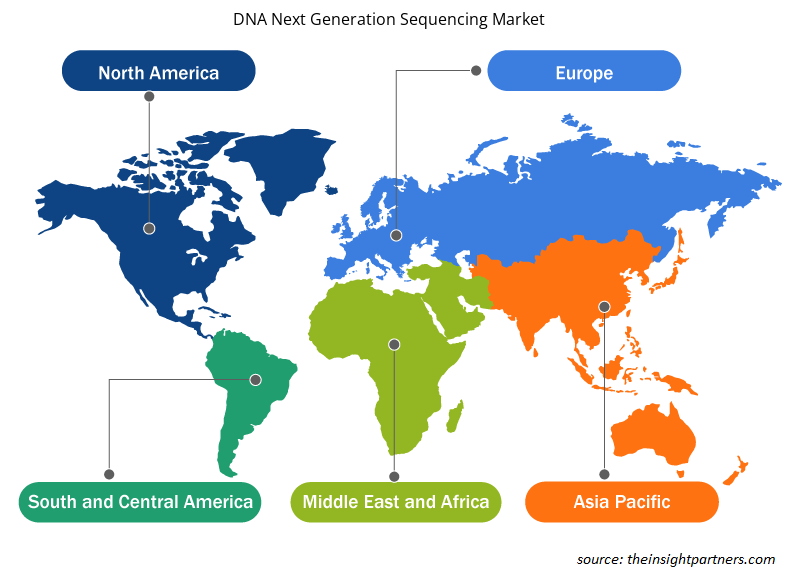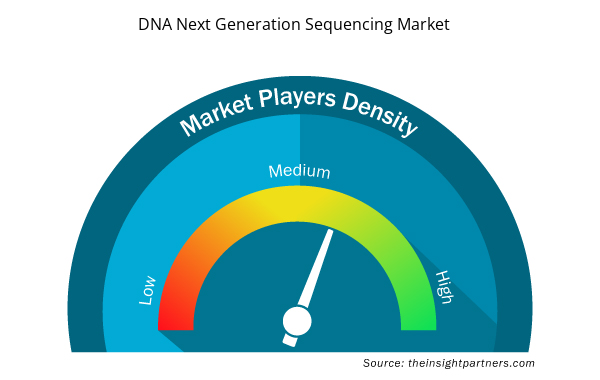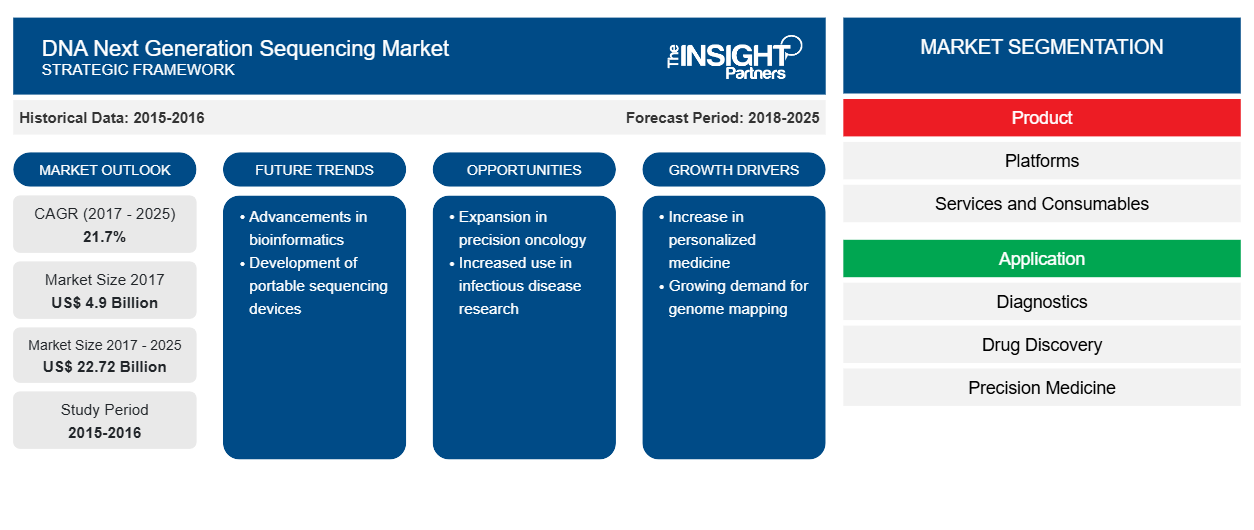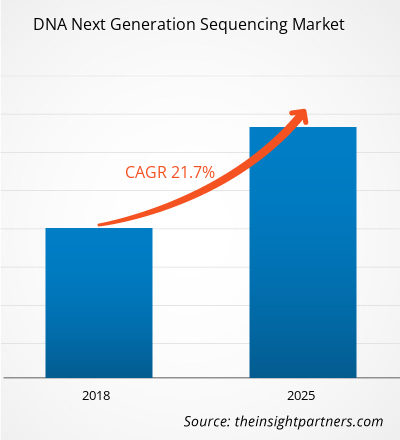[연구보고서] DNA 차세대 시퀀싱 시장 규모는 2017년 4,898.5백만 달러에서 2025년까지 22,716.9백만 달러로 성장할 것으로 추산되며, 2018-2025년 동안 21.7%의 CAGR 로 성장할 것으로 예상됩니다 .
차세대 시퀀싱은 고처리량 시퀀싱이라고도 합니다. NGS는 DNA 샘플의 염기쌍을 빠르게 시퀀싱할 수 있게 합니다. NGS 는 약물 발견 애플리케이션을 주도 하고 개인화된 의학, 유전적 질환 및 임상 진단의 미래를 가능하게 합니다. 게다가 차세대 시퀀싱( NGS )은 확장성, 초고처리량 및 빠른 속도로 전체 게놈의 뉴클레오티드 순서를 확립할 수 있는 대규모 병렬 시퀀싱 기술입니다 . 후속 시퀀싱 반응을 위해 샘플을 준비하는 것을 포함하기 때문에 DNA 사전 시퀀싱은 전체 시퀀싱 프로토콜에서 가장 중요한 프로세스 중 하나입니다. 글로벌 의료 분야에서 NGS는 임상 실험실 분석, 테스트 및 질병 진단에 꾸준히 통합되고 있습니다. 약물유전체학 에서 NGS는 약물 발견 프로세스를 가속화하는 데 널리 사용되었습니다.
DNA 차세대 시퀀싱 시장 성장은 전 세계적으로 암 발병 사례가 증가하고, 연구 조사가 증가하고, 연구 기관과 시장 참여자 간의 협업이 증가하고, DNA 차세대 시퀀싱의 적용이 증가하고, 시퀀싱 기술의 기술적 발전이 이루어졌기 때문입니다. 그러나 숙련된 전문가가 부족하여 DNA 차세대 시퀀싱 시장 전체 성장에 중대한 영향을 미칠 것으로 예상됩니다.
귀하의 요구 사항에 맞게 이 보고서를 사용자 정의하세요
이 보고서의 일부 또는 국가 수준 분석, Excel 데이터 팩을 포함하여 모든 보고서에 대한 사용자 정의를 무료로 받을 수 있으며 신생 기업 및 대학을 위한 훌륭한 혜택과 할인 혜택을 이용할 수 있습니다.
- 이 보고서의 주요 시장 동향을 알아보세요.이 무료 샘플에는 시장 동향부터 추정 및 예측까지 다양한 데이터 분석이 포함됩니다.
시장 통찰력
시퀀싱 가격 하락과 시퀀싱 방법의 기술적 발전이 DNA 차세대 시퀀싱 시장을 주도하다
최근 몇 년 동안 차세대 시퀀싱 가격이 상당히 하락했습니다. 2000년에 인간 게놈 시퀀싱 비용은 37억 달러였고 완료까지 13년이 걸렸습니다. 그러나 최근 몇 년 동안 비용은 2006년에 1,000만 달러로 감소했고 2012년에는 더욱 감소했으며 프로세스에 필요한 일수도 줄었습니다. Illumina 와 Roche와 같은 주요 DNA 차세대 시퀀싱 시장 참여자는 비용 효율적이고 시퀀싱 프로세스에 소요되는 시간이 덜 걸리는 획기적인 기술을 도입했습니다.
게다가 분자생물학 분야의 발전은 시퀀싱 절차를 동등하게 향상시켰습니다. 많은 업계 참여자들이 지난 몇 년 동안 혁신적인 NGS 기술을 내놓았습니다. 예를 들어 Pacific Biosciences 의 Sequel과 Oxford Nanopore 의 PromethION이 있습니다 . 또한 시장을 지배하는 세 가지 고급 NSG 시스템으로는 Roche GS FLX (454), Illumina HiSeq 2000( Solexa ), AB SOLiD ( Agencourt )가 있습니다.
이 프로세스의 추가 수정 및 자동화는 시퀀싱 데이터를 계속 증가시켰고, 또한 시간을 보다 효율적으로 관리하게 되었으며, 그 결과 연구자들은 인간 게놈 프로젝트에서 주요 이정표에 도달할 수 있었습니다. NGS는 시퀀스 기반 유전자 발현 분석을 아날로그 기술에 대한 "디지털" 대안으로 만듭니다. 게놈 시퀀싱의 발전으로 시퀀싱이 쉽고 정확해졌습니다. 이러한 기술적 발전은 가까운 미래에 DNA 차세대 시퀀싱 시장 규모를 확대할 가능성이 높습니다.
제품 기반 통찰력
글로벌 DNA 차세대 시퀀싱 시장은 제품을 기준으로 플랫폼, 서비스, 소모품으로 세분화됩니다. 플랫폼 세그먼트는 HiSeq 시리즈, MiSeq 시리즈, SOLiD, Ion Torrent, Pacbio Rs II 및 Sequel Systems 등으로 세분화됩니다. 나아가 서비스 세그먼트는 시퀀싱 서비스와 데이터 관리 및 분석 서비스로 세분화됩니다. 또한 소모품 세그먼트는 샘플 소모품 준비 및 기타 NGS 소모품으로 세분화됩니다. 소모품 세그먼트는 2017년 DNA 차세대 시퀀싱 시장에서 제품 하위 세그먼트 중에서 더 큰 점유율을 차지했으며 예측 기간 동안에도 유사한 추세를 따를 것으로 예상됩니다. 최근의 NGS 플랫폼은 DNA의 사전 증폭이 필요하지 않은 단일 분자 시퀀싱(SMS)이라는 새로운 시퀀싱 방법을 채택하여 PCR 관련 오류 판독이나 반복 영역에 대한 증폭 편향을 방지합니다. 지난 5년 동안 차세대 시퀀싱(NGS)은 연구에서 임상적 사용으로 전환되었습니다. 최소 14개국이 대규모 인구를 시퀀싱하기 위한 이니셔티브를 만들었고, 2025년까지 전 세계적으로 6천만 명 이상의 사람들이 게놈 시퀀싱을 받을 것으로 예상됩니다.
애플리케이션 기반 통찰력
글로벌 DNA 차세대 시퀀싱 시장은 응용 분야를 기준으로 진단, 약물 발견, 정밀 의학 및 기타 응용 분야로 세분화됩니다. 진단 부문은 2017년에 가장 큰 점유율을 차지했으며 향후 5~6년 동안 상당한 성장을 보일 것으로 예상됩니다. 진단 게놈 관리에서 차세대 시퀀싱(NGS) 기술을 사용하려면 정밀성과 정확성이 필요합니다. NGS 기술은 비용 효율적인 시퀀싱을 사용하여 전체 게놈 시퀀싱에서 환자에 대한 게놈 정보를 얻어 임상 조치를 수행합니다. 차세대 시퀀싱은 결국 다양한 유전적 질환을 진단하기 위해 기존 기술을 대체하고 있습니다. 이제 유전자별 접근 방식 대신 단일 테스트에서 많은 유전자 세트를 처리할 수 있습니다.
최종 사용자 기반 통찰력
최종 사용자를 기준으로 한 글로벌 시장은 학술 및 연구 기관, 제약 및 생명 공학 회사, 병원 및 진료소, 기타 최종 사용자로 세분화됩니다. 학술 및 연구 기관 부문은 예측 기간 동안 가장 높은 성장을 보일 것으로 예상됩니다. 이 시퀀스는 과학자들이 특정 DNA 세그먼트에 포함된 유전 정보의 종류를 찾는 데 도움이 됩니다. 예를 들어, 과학자들은 시퀀스 정보를 사용하여 어떤 DNA 구간에 유전자가 포함되어 있고 어떤 구간에 유전자를 켜거나 끄는 규제 지침이 포함되어 있는지 확인할 수 있습니다. 무작위 또는 샷건 시퀀싱을 기반으로 하는 자동화된 산업화된 접근 방식은 메릴랜드주 록빌에 있는 게놈 연구소(TIGR)에서 도입했으며, 그 결과 337개의 새로운 인간 유전자와 다른 유기체의 48개의 상동 유전자가 발표되었습니다.
DNA 차세대 시퀀싱 시장 지역 통찰력
Insight Partners의 분석가들은 예측 기간 동안 DNA 차세대 시퀀싱 시장에 영향을 미치는 지역적 추세와 요인을 철저히 설명했습니다. 이 섹션에서는 북미, 유럽, 아시아 태평양, 중동 및 아프리카, 남미 및 중미의 DNA 차세대 시퀀싱 시장 세그먼트와 지리에 대해서도 설명합니다.

- DNA 차세대 시퀀싱 시장을 위한 지역별 특정 데이터 얻기
DNA 차세대 시퀀싱 시장 보고서 범위
| 보고서 속성 | 세부 |
|---|---|
| 2017년 시장 규모 | 49억 달러 |
| 2025년까지 시장 규모 | 227억 2천만 달러 |
| 글로벌 CAGR (2017-2025) | 21.7% |
| 역사적 데이터 | 2015-2016 |
| 예측 기간 | 2018-2025 |
| 다루는 세그먼트 | 제품별로
|
| 포함된 지역 및 국가 | 북아메리카
|
| 시장 선도 기업 및 주요 회사 프로필 |
|
시장 참여자 밀도: 비즈니스 역학에 미치는 영향 이해
DNA 차세대 시퀀싱 시장은 소비자 선호도의 변화, 기술 발전, 제품의 이점에 대한 인식 증가와 같은 요인으로 인해 최종 사용자 수요가 증가함에 따라 빠르게 성장하고 있습니다. 수요가 증가함에 따라 기업은 제품을 확장하고, 소비자의 요구를 충족하기 위해 혁신하고, 새로운 트렌드를 활용하여 시장 성장을 더욱 촉진하고 있습니다.
시장 참여자 밀도는 특정 시장이나 산업 내에서 운영되는 회사나 기업의 분포를 말합니다. 주어진 시장 공간에 얼마나 많은 경쟁자(시장 참여자)가 존재하는지 그 규모나 전체 시장 가치에 비해 나타냅니다.
DNA 차세대 시퀀싱 시장에서 운영되는 주요 회사는 다음과 같습니다.
- 일루미나 주식회사
- 써모 피셔
- 키아젠 NV
- 베이징 유전체학 연구소
- 퍼킨엘머 주식회사
면책 조항 : 위에 나열된 회사는 어떤 특별한 순서에 따라 순위가 매겨지지 않았습니다.

- DNA 차세대 시퀀싱 시장 주요 기업 개요를 알아보세요
제품 출시와 승인은 일반적으로 기업이 글로벌 입지와 제품 포트폴리오를 확장하기 위해 채택하는 전략입니다. 게다가, 시장 참여자들은 고객층을 확대하기 위한 파트너십 전략에 집중하며, 이를 통해 전 세계적으로 브랜드 이름을 유지할 수 있습니다. 시장 참여자들이 새로운 혁신 제품을 개발함에 따라 시장 점유율이 증가할 것으로 예상됩니다. 관련 시장에 참여하는 시장 참여자 중 일부는 THERMO FISHER SCIENTIFIC INC.; Illumina, Inc.; Qiagen NV; Beijing Genomics Institute; PerkinElmer, Inc.; F.Hoffman-La Roche Ltd.; Agilent Technologies; Eurofins Scientific; Oxford Nanopore Technologies Ltd; 및 Macrogen Inc.입니다.
- 역사적 분석(2년), 기준 연도, CAGR을 포함한 예측(7년)
- PEST 및 SWOT 분석
- 시장 규모 가치/양 - 글로벌, 지역, 국가
- 산업 및 경쟁 환경
- Excel 데이터 세트



Report Coverage
Revenue forecast, Company Analysis, Industry landscape, Growth factors, and Trends

Segment Covered
This text is related
to segments covered.

Regional Scope
North America, Europe, Asia Pacific, Middle East & Africa, South & Central America

Country Scope
This text is related
to country scope.
자주 묻는 질문
The DNA next generation sequencing market is growing at CAGR of 21.7% from 2018-2025.
Major market players such as Illumina and Roche have introduced breakthrough technologies that have enabled in the cost and time reduction in the sequencing.
As per forecast report, the market value of DNA next generation sequencing market in 2025 will be US$ 22,716.9 Million.
The growth of the global DNA next generation sequencing market is attributed to the increases in cancer prevalence, technological development and decreasing price of sequencing. Owing to factors like advances within the field of genetic science, development in several ways and methods for sequencing, there's a notable decline within the price of sequencing.
Trends and growth analysis reports related to Life Sciences : READ MORE..
The List of Companies
1. Illumina, Inc.
2. Thermo Fisher
3. Qiagen N.V.
4. Beijing Genomics Institute
5. PerkinElmer, Inc.
6. Hoffman-La Roche Ltd.
7. Agilent Technologies
8. Eurofins Scientific
9. Oxford Nanopore Technologies Ltd.
10. Macrogen Inc.
The Insight Partners performs research in 4 major stages: Data Collection & Secondary Research, Primary Research, Data Analysis and Data Triangulation & Final Review.
- Data Collection and Secondary Research:
As a market research and consulting firm operating from a decade, we have published and advised several client across the globe. First step for any study will start with an assessment of currently available data and insights from existing reports. Further, historical and current market information is collected from Investor Presentations, Annual Reports, SEC Filings, etc., and other information related to company’s performance and market positioning are gathered from Paid Databases (Factiva, Hoovers, and Reuters) and various other publications available in public domain.
Several associations trade associates, technical forums, institutes, societies and organization are accessed to gain technical as well as market related insights through their publications such as research papers, blogs and press releases related to the studies are referred to get cues about the market. Further, white papers, journals, magazines, and other news articles published in last 3 years are scrutinized and analyzed to understand the current market trends.
- Primary Research:
The primarily interview analysis comprise of data obtained from industry participants interview and answers to survey questions gathered by in-house primary team.
For primary research, interviews are conducted with industry experts/CEOs/Marketing Managers/VPs/Subject Matter Experts from both demand and supply side to get a 360-degree view of the market. The primary team conducts several interviews based on the complexity of the markets to understand the various market trends and dynamics which makes research more credible and precise.
A typical research interview fulfils the following functions:
- Provides first-hand information on the market size, market trends, growth trends, competitive landscape, and outlook
- Validates and strengthens in-house secondary research findings
- Develops the analysis team’s expertise and market understanding
Primary research involves email interactions and telephone interviews for each market, category, segment, and sub-segment across geographies. The participants who typically take part in such a process include, but are not limited to:
- Industry participants: VPs, business development managers, market intelligence managers and national sales managers
- Outside experts: Valuation experts, research analysts and key opinion leaders specializing in the electronics and semiconductor industry.
Below is the breakup of our primary respondents by company, designation, and region:

Once we receive the confirmation from primary research sources or primary respondents, we finalize the base year market estimation and forecast the data as per the macroeconomic and microeconomic factors assessed during data collection.
- Data Analysis:
Once data is validated through both secondary as well as primary respondents, we finalize the market estimations by hypothesis formulation and factor analysis at regional and country level.
- Macro-Economic Factor Analysis:
We analyse macroeconomic indicators such the gross domestic product (GDP), increase in the demand for goods and services across industries, technological advancement, regional economic growth, governmental policies, the influence of COVID-19, PEST analysis, and other aspects. This analysis aids in setting benchmarks for various nations/regions and approximating market splits. Additionally, the general trend of the aforementioned components aid in determining the market's development possibilities.
- Country Level Data:
Various factors that are especially aligned to the country are taken into account to determine the market size for a certain area and country, including the presence of vendors, such as headquarters and offices, the country's GDP, demand patterns, and industry growth. To comprehend the market dynamics for the nation, a number of growth variables, inhibitors, application areas, and current market trends are researched. The aforementioned elements aid in determining the country's overall market's growth potential.
- Company Profile:
The “Table of Contents” is formulated by listing and analyzing more than 25 - 30 companies operating in the market ecosystem across geographies. However, we profile only 10 companies as a standard practice in our syndicate reports. These 10 companies comprise leading, emerging, and regional players. Nonetheless, our analysis is not restricted to the 10 listed companies, we also analyze other companies present in the market to develop a holistic view and understand the prevailing trends. The “Company Profiles” section in the report covers key facts, business description, products & services, financial information, SWOT analysis, and key developments. The financial information presented is extracted from the annual reports and official documents of the publicly listed companies. Upon collecting the information for the sections of respective companies, we verify them via various primary sources and then compile the data in respective company profiles. The company level information helps us in deriving the base number as well as in forecasting the market size.
- Developing Base Number:
Aggregation of sales statistics (2020-2022) and macro-economic factor, and other secondary and primary research insights are utilized to arrive at base number and related market shares for 2022. The data gaps are identified in this step and relevant market data is analyzed, collected from paid primary interviews or databases. On finalizing the base year market size, forecasts are developed on the basis of macro-economic, industry and market growth factors and company level analysis.
- Data Triangulation and Final Review:
The market findings and base year market size calculations are validated from supply as well as demand side. Demand side validations are based on macro-economic factor analysis and benchmarks for respective regions and countries. In case of supply side validations, revenues of major companies are estimated (in case not available) based on industry benchmark, approximate number of employees, product portfolio, and primary interviews revenues are gathered. Further revenue from target product/service segment is assessed to avoid overshooting of market statistics. In case of heavy deviations between supply and demand side values, all thes steps are repeated to achieve synchronization.
We follow an iterative model, wherein we share our research findings with Subject Matter Experts (SME’s) and Key Opinion Leaders (KOLs) until consensus view of the market is not formulated – this model negates any drastic deviation in the opinions of experts. Only validated and universally acceptable research findings are quoted in our reports.
We have important check points that we use to validate our research findings – which we call – data triangulation, where we validate the information, we generate from secondary sources with primary interviews and then we re-validate with our internal data bases and Subject matter experts. This comprehensive model enables us to deliver high quality, reliable data in shortest possible time.


 이 보고서에 대한 무료 샘플을 받으세요
이 보고서에 대한 무료 샘플을 받으세요